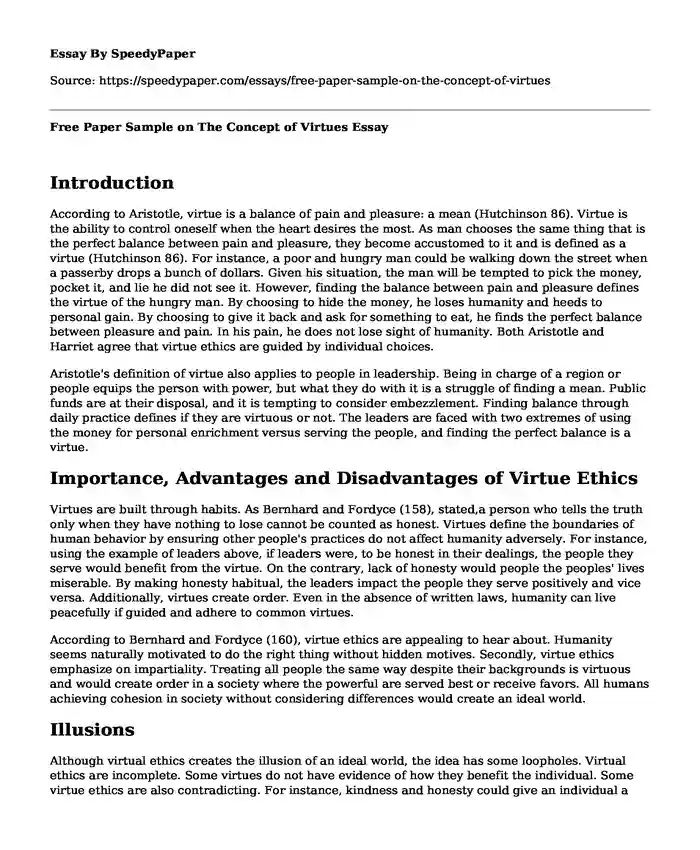
| Type of paper: | Essay |
| Categories: | Psychology Ethics Personality Human behavior |
| Pages: | 3 |
| Wordcount: | 705 words |
Introduction
According to Aristotle, virtue is a balance of pain and pleasure: a mean (Hutchinson 86). Virtue is the ability to control oneself when the heart desires the most. As man chooses the same thing that is the perfect balance between pain and pleasure, they become accustomed to it and is defined as a virtue (Hutchinson 86). For instance, a poor and hungry man could be walking down the street when a passerby drops a bunch of dollars. Given his situation, the man will be tempted to pick the money, pocket it, and lie he did not see it. However, finding the balance between pain and pleasure defines the virtue of the hungry man. By choosing to hide the money, he loses humanity and heeds to personal gain. By choosing to give it back and ask for something to eat, he finds the perfect balance between pleasure and pain. In his pain, he does not lose sight of humanity. Both Aristotle and Harriet agree that virtue ethics are guided by individual choices.
Aristotle's definition of virtue also applies to people in leadership. Being in charge of a region or people equips the person with power, but what they do with it is a struggle of finding a mean. Public funds are at their disposal, and it is tempting to consider embezzlement. Finding balance through daily practice defines if they are virtuous or not. The leaders are faced with two extremes of using the money for personal enrichment versus serving the people, and finding the perfect balance is a virtue.
Importance, Advantages and Disadvantages of Virtue Ethics
Virtues are built through habits. As Bernhard and Fordyce (158), stated,a person who tells the truth only when they have nothing to lose cannot be counted as honest. Virtues define the boundaries of human behavior by ensuring other people's practices do not affect humanity adversely. For instance, using the example of leaders above, if leaders were, to be honest in their dealings, the people they serve would benefit from the virtue. On the contrary, lack of honesty would people the peoples' lives miserable. By making honesty habitual, the leaders impact the people they serve positively and vice versa. Additionally, virtues create order. Even in the absence of written laws, humanity can live peacefully if guided and adhere to common virtues.
According to Bernhard and Fordyce (160), virtue ethics are appealing to hear about. Humanity seems naturally motivated to do the right thing without hidden motives. Secondly, virtue ethics emphasize on impartiality. Treating all people the same way despite their backgrounds is virtuous and would create order in a society where the powerful are served best or receive favors. All humans achieving cohesion in society without considering differences would create an ideal world.
Illusions
Although virtual ethics creates the illusion of an ideal world, the idea has some loopholes. Virtual ethics are incomplete. Some virtues do not have evidence of how they benefit the individual. Some virtue ethics are also contradicting. For instance, kindness and honesty could give an individual a hard time choosing one over the other. For example, if a married woman sees a counselor and tells them about an affair, and the husband later confesses that if he found out the wife was cheating on him, he would kill her. If the two see the counselor seek help on difficulties in their marriage caused by unfaithfulness, the counselor is trapped between honesty and kindness. The counselor could assume that the husband swore to kill in the moment of anger and thus reveal the truth to make handling the issue easier, but it is risky. While she wants to be kind to the woman by protecting her secret, she also wants to be honest with the husband and bring the dispute to an end. Virtual ethics, in this case, are contradicting, and are, in many similar cases.
Conclusion
Virtue is defined by habits through daily choices. Choosing the same right thing always is the perfect balance between pain and pleasure, which builds virtues. Even in the absence of law, being guided by virtues would eliminate vices.
Works Cited
Fabian, Bernhard, and David Fordyce. The elements of moral philosophy. Georg Olms Verlag, 1990.
Hutchinson, Douglas S. The virtues of Aristotle. Routledge, 2015.
Cite this page
Free Paper Sample on The Concept of Virtues. (2023, Oct 31). Retrieved from https://speedypaper.net/essays/free-paper-sample-on-the-concept-of-virtues
Request Removal
If you are the original author of this essay and no longer wish to have it published on the SpeedyPaper website, please click below to request its removal:
- Free Paper Sample on Police Brutality and African-American Stereotypes in Media
- Masculinity - Free Essay Example
- Leadership Journal - Essay Sample
- Essay Example on the Effect of Pornography on Social Relationships
- How to Tame a Wild Tongue - Literary Essay Example
- Free Essay: Boiler Room Movie and the Finance Topic
- Paper Example. Love at First Sight
Popular categories




